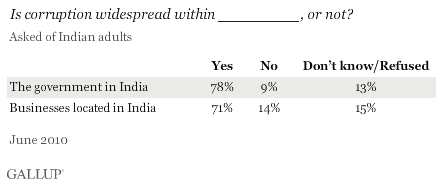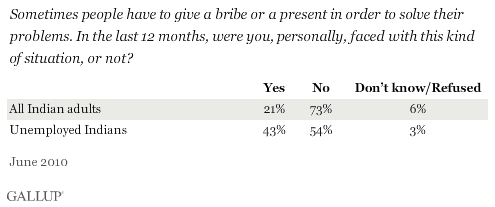WASHINGTON, D.C. -- The recent wave of anti-corruption protests in India likely reflects the sense among many Indians that the country's corruption problem is growing worse. In 2010, almost half (47%) said the level of corruption in India was higher than it was five years earlier, while 27% said it was about the same.

The protests in early April were part of a nationwide campaign to block the passage of a proposed Lokpal (ombudsman) Bill that opponents considered too weak. After social activist Anna Hazare's four-day hunger strike, the government agreed to redraft the bill, this time giving civil society representatives a greater role in ensuring a new government ombudsman's office would have enough power to enforce anti-corruption laws.
The groundswell of public support for Hazare and the anti-corruption movement shows Indians recognize that the problem is endemic in their society. In response to the 2010 poll, 78% of Indians said corruption is widespread within the Indian government, and 71% said it is widespread within businesses in India.

Asked whether they thought the government was doing enough to fight corruption, more than one-third of Indians (35%) said yes, while half (50%) said no. Unemployed Indians were particularly likely to feel the government was not doing enough to fight corruption, with nearly two-thirds (65%) responding that way.
Unemployed Indians were also among the most likely to say they recently found themselves in a situation in which they needed to pay a bribe. Bribery remains widespread in Indian society; about one in five Indians (21%) overall said they had faced a situation in the past 12 months in which a bribe was required to solve a problem. Among the country's unemployed, however, the figure rises to 43% -- an indicator that those seeking welfare and job services are among the most vulnerable.

Bottom Line
Following recent high-profile scandals -- including a collusion scheme that landed India's telecom minister in jail, and allegations that the planners of last year's Commonwealth games stole billions -- Indians have begun to act on their frustration with the country's corruption problem. Survey results reveal Indians do not believe the problem is getting any better and many have had to deal with corruption personally. However, the likelihood that systemic change can be implemented largely depends on whether Indians' underlying dissatisfaction produces sustained public pressure for reform.
Survey Methods
Results are based on face-to-face interviews with 6,000 adults, aged 15 and older, per survey wave. For results based on this total sample, one can say with 95% confidence that the maximum margin of sampling error is ±1.7 percentage points. The margin of error reflects the influence of data weighting. In addition to sampling error, question wording and practical difficulties in conducting surveys can introduce error or bias into the findings of public opinion polls.
For complete methodology and specific survey dates, please review Gallup's Country Data Set details.
Learn more about how the Gallup World Poll works.
